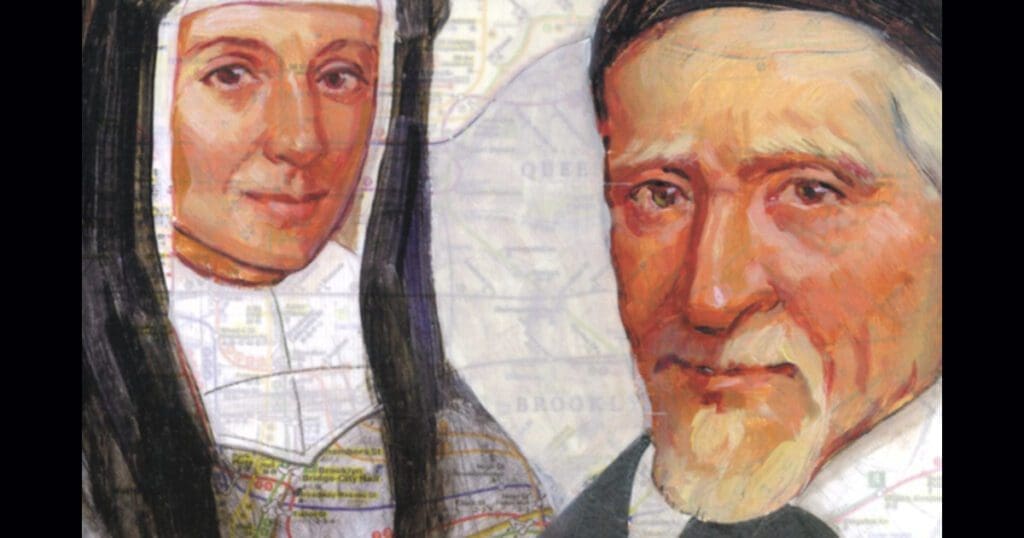I suspect we have all known relationships that should not have worked out… but did.
Those familiar only with the younger lives of St. Vincent and St. Louise would have been surprised by their lifelong journey. Vincent and Louise would not have been considered a good bet as a relationship that would work out.
Yet, knowing the last chapters of their lives, we see they were both transformed and transforming. Together they did things that transformed the face of France. (Louise gets little credit for reasons that would take us too far afield.)
Their journey transformed them from opposites to equals.
They offer important lessons for a divided church today.

Inauspicious beginnings
Their journey should not have worked out as it did.
Vincent and Louise came from very different backgrounds.
Vincent was a country boy. We presume he was loved and wanted by his family.
Louise was a city girl, illegitimate, lonely, isolated, not wanted.
Their personalities were very different.
At the risk of over-simplifying, Vincent was outgoing, smart in the ways of the world.
Louise was more introverted, anxious, organized, strong-willed, yet a worrier.
There are many early hints they themselves did not expect much of their relationship. They certainly never envisioned how intertwined their lives would become.
Yet, their 35-year journey from opposites to equals transformed not only themselves but also France, the Church, and religious life.
It was not always a smooth journey
Some (“Collaboration between two exceptional people“] have observed that for nine years, they had major differences over many structural concerns for the Daughters. But they learned to respect each other and the people they served.
Yet Vincent and Louise continued to collaborate. They set up missions, worked with the Ladies of Charity, hospital administrators, parish priests, Bishops, Cardinals, politicians, penal systems, and other organizations. Above all the they wanted the poor better served and evangelized.
Their relationship worked because they discovered they shared a common dream – serving the broken and bleeding bodies of Christ. They listened to the voice of God calling them and respected that each saw different aspects of that dream.
The lively exchanges between these two pioneers of charity, enable us to glimpse the movement of the Spirit. Together they brought good news to those suffering from spiritual neglect and living on the margins of society.
Animated by a solid sense of mission and what they believed to be the will of God, They combined their natural gifts and skills in respectful co-responsibility.
They prove that whatever our background, personality, life experiences, conflicts and opposites people can work together toward a common vision.
A synodal journey?
Isn’t this on a personal level what Pope Francis is urging all of us to do? Listen to the spirit speaking to us and each other about things we may not yet appreciate.
We SAY we are each God’s sons and daughters. But we are still scratching at the surface of LIVING God’s vision.
In initiating the world’s largest conversation, Pope Francis is calling us to listen together to the Spirit.
Vincent and Louise might not have used the language of encounter and synodality, but they teach us much about how the process unfolds over a lifetime.
It is a journey from opposites to equals seeking to understand… and live… the same vision under the guidance of the Spirit.
Together we learn the implications of Jesus’ prayer – Our Father.
Vincent and Louise came to appreciate each other’s way of looking at how to serve.
I think I need to reflect more on Vincent and Louise as models of synodal spirituality.
Originally posted on Vincentian Mindwalk





Thanks, John, for holding up St. Louise and St. Vincent as models of synodal spirituality and journey. Indeed, our divided Church needs more members like them, more unlikely friends, as Vincent and Jean-Jacques Olier, too, were (https://via.library.depaul.edu/cgi/viewcontent.cgireferer=&httpsredir=1&article=1306&context=vhj).
Another thing about Vincent and Louise was that they did not let the box of existing church structure hem them in. Rather, they thought outside the box and brought forth novel foundations, like that of the Company of the Daughters of Charity, for example. While resigned to the disappearance of deaconesses in the Church, “because of some unknown design of Providence,” Vincent though suggested that the ministry of deaconesses was back in the ministry of the Ladies of Charity, saying to them: “This same Providence calls some of you to provide for the needs of the sick poor in the hospital” (SV.FR XIII:810).
Needless to say, of course, the synodality of Louise and Vincent, their listening together to the Spirit speaking to them and each other would not have been possible without humility, so foundational to both, and which St. Gregory the Great called “the mother and mistress of virtues” (see http://www.liturgies.net/Liturgies/Catholic/loh/week9wednesdayor.htm).
The correct link to St. Vincent and Jean-Jacques Olier is https://via.library.depaul.edu/cgi/viewcontent.cgi?referer=&httpsredir=1&article=1306&context=vhj.
Indeed, if we as Vincentians can follow.St. Vincent and St. Louise, we can work together as Vincentians to reach out to more of those we are serving. Knowing our different backgrounds , spirituality, etc, without imposing our Ideas on each other, but to find a common ground to work on, as Vincent and Louise did.
Thanks for sharing